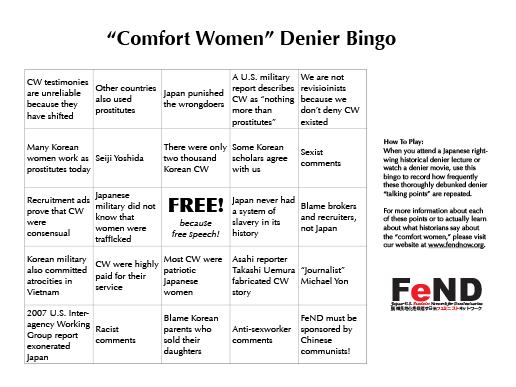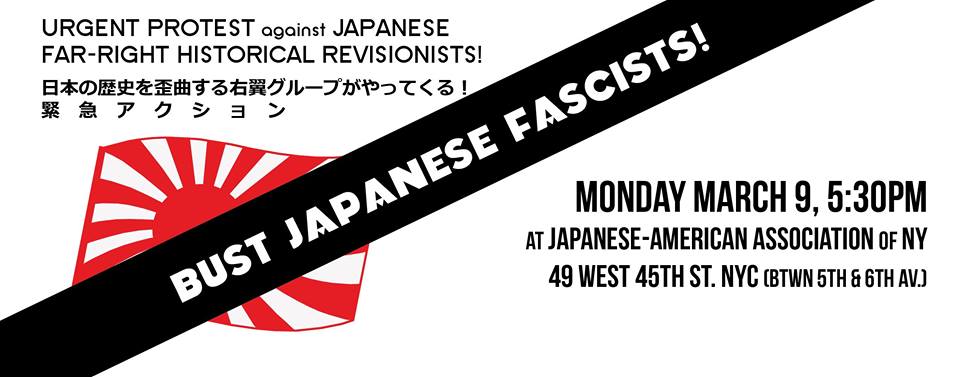Tag Archives: comfort women
Play “Comfort Women” Denier Bingo!
Here’s the “comfort women” denier bingo! If for some reason you were to attend a Japanese far-right revisionist lecture (like the one at Central Washington University next week) or watch a revisionist video, use this bingo to track how frequently these thoroughly debunked right-wing denier arguments are made. Click on the image to download the PDF version for printing at home. Enjoy!
For more information, read Debunking the Japanese “Comfort Women” Denier Talking Points.
Debunked: Right-wing “evidences” that supposedly prove “ethical” recruitment of “comfort women”
Aside from the 1944 U.S. military report that we analyzed previously, there are a few more historical documents that the Japanese far-right historical revisionists use repeatedly as “evidences” that “comfort women” were not systematically trafficked by the Japanese military and its contractors, but were recruited legally and ethically. These documents come in three categories: 1) recruitment ads published in Korean newspapers seeking applicants for “comfort women”; 2) the 1938 directive by Japan’s Deputy Army Secretary requesting the military to carefully vet contractors recruiting and managing “comfort women” to ensure that their conduct would not “disgrace” the Japanese military; and 3) newspaper articles that “prove” that Japanese government prosecuted kidnapping and forced prostitution.
Let’s start with the recruitment ads. Right-wing nationalists argue that the existence of ads explicitly recruiting “comfort women” proves that the recruitment was done fair and square, and that their pay was quite high. But there is a problem with it: the literacy rate for Korean women of that generation was low. In other words, except for a small number of elites, who would probably not voluntarily choose to become “comfort women,” Korean women at the time would not have been able to read the ads.
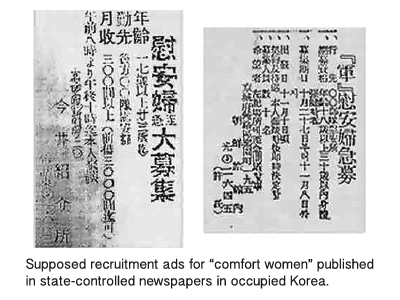
Historians believe that these ads were not actually targeted toward potential “comfort women” applicants, but toward independent recruiters and subcontractors that would supply the contractor with the women that they could then ship to “comfort stations” across Asia. Thus, the only thing these ads prove is the existence of a market to buy and sell women, and they do not indicate how these women were recruited. Besides, only two such ads have been discovered so far, and cannot be responsible for the recruitment of all the women who became “comfort women.”
Which brings us to the next document: the 1938 directive by the Deputy Army Secretary that denounces recruiters that use deceptive or otherwise problematic tactics that “diminish the military’s dignity” and urges Japanese military to carefully vet contractors. This document was first publicized by Asahi Shimbun newspaper in 1992 as a proof that the Japanese military was directly involved in the operation of the “comfort women” system, but since then reclaimed by the right-wing nationalists as an evidence for what they call “good involvement”–that is, the argument that Japanese military’s only involvement with the “comfort women” system was to prevent trafficking and protect women.
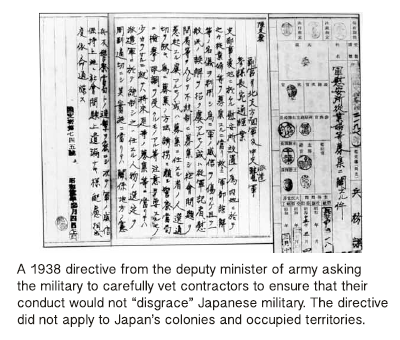
The impetus for this directive came from early stages of the “comfort women” deployment, when most “comfort women” were still Japanese women. The military tried to recruit “comfort women” from women who were already working at brothels (most likely under debt bondage), luring them with a way to repay their debt more quickly. But some contractors began luring other, “pure” Japanese women by deceiving them about the nature of the “good job” they were offering, and it led to criticisms from within Japan. The 1938 directive specifically mentions instances of kidnapping and deceptive recruitment in Japan, and it only applies to recruitment in Japan. No comparable directives have been issued that applied to Japan’s colonies (Korea and Taiwan) or its occupied territories.
To counter this criticism, the right-wing nationalists often produce newspaper articles about arrests and prosecution of individuals who kidnapped or sold women into prostitution in Korea. But these are cases of simple kidnapping or forced prostitution by criminal elements, and do not show that Japanese government properly regulated its licensed contractors who recruited Korean women for Japanese enforced military prostitution, or that it protected Korean women from such recruitment.
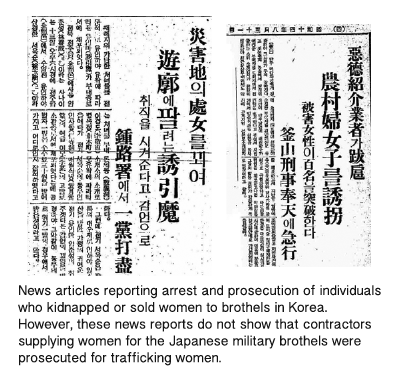
Japan was a signatory to the International Convention for the Suppression of the Traffic in Women and Children of 1921, which prohibited the recruitment of women under the age 21 for prostitution even with her consent, as well as the use of force, fraud, or coercion (including debt bondage) in the recruitment of adult women for prostitution. However, when Japan signed the treaty, it declared that new treaty would not apply to its colonies (Korea and Taiwan) or occupied territories, clearly indicating the Japanese government’s conscious policy choice to permit and sanction the trafficking of Korean and Taiwanese women and girls, which helped to further its imperial war of aggression in Asia and the Pacific.
Central Washington University community responds to “comfort women” denier event on campus
Members of Central Washington University community are outraged about the upcoming film screening and lecture later this month on campus by a professional Japanese “comfort women” denier and a failed 2011 candidate for the governorship of Tokyo receiving 0.2% of the votes, Mr. Yujiro Taniyama. At the invitation of Japanese language instructor Ms. Mariko Okada-Collins, Mr. Taniyama will show his fauxcumentary “Scottsboro Girls” on April 28th and 29th at CWU, located in Ellensburg, Washington.
While Taniyama claims to introduce a new perspective that “challenges the conventional wisdom” regarding the “comfort women,” his film seems, based on the trailer posted on YouTube, to recycle the same old revisionist talking points that have been thoroughly debunked, including the oft-misrepresented 1944 U.S. military report.
In response to the upcoming events, anthropologist Dr. Mark Auslander and others have organized an academic panel to discuss the true history of “comfort women,” featuring specialists from CWU community as well as from other universities. In addition, performance arts students are putting on a public reading of the testimonies of former “comfort women” on campus to raise awareness of the issue. (Download the PDF flier of the event here.)
Mr. Taniyama and Ms. Okada-Collins insist that they are simply trying to uncover truth or to present an alternative perspective on the topic, but their reliance on misrepresentations of historical documents and contemporary scholarly works (mainly those of Korean scholars Ahn Byong Jik and Park Yuha, neither of whom actually agree with Mr. Taniyama’s or Ms. Okada-Collins’ views) prove the fundamental dishonesty of their historical revisionist project.
In recent years, Japanese far-right nationalists have declared the U.S. to be the “shusenjo,” or the main battleground, in their “history war” on “comfort women.” Their goal is to recruit as many politicians, journalists, opinion leaders, and scholars as possible to question the orthodox narrative of “comfort women” as the victims of a system of enforced military prostitution. The CWU events are a significant development in their campaign because it is the first time that a U.S. college or university allowed itself to play host to the Japanese equivalent of neo-Nazis on its campus.
The problem with giving an academic platform to historical deniers, whether they are denying crimes of the Holocaust or those of “comfort women,” is that they do not have to prove their points or convince us of their propaganda in order for them to win. They can claim victory simply by introducing enough doubt in the legitimate history; they can win simply by projecting an impression that legitimate historians might be on both sides of controversy regarding the historical crime they are denying, or by making others accept their premise that they are seeking the truth. Anything short of recognizing them as fundamentally dishonest and unscholarly political campaign is a victory for them.
There can certainly be legitimate disagreements about the exact number of “comfort women” (i.e. whether there were tens or hundreds of thousands) or the extent to which Japanese military was directly involved in the trafficking and exploitation of women in the system, but there is no disagreement among the academic community that Japanese military established, maintained, and managed a system of enforced military prostitution that relied on force, fraud, or coercion against women of its colonies and occupied territories.
We are also concerned that in a letter published on Mr. Taniyama’s website, Ms. Okada-Collins admits to teaching her version of “truth” of modern East Asian history in her classes, which includes denial of Nanjing massacre (the “Rape of Nanjing”) and “comfort women.” In the letter, she explains her belief that teaching of language must include “instructions” on culture and history, and states that she uses every opportunity in her classroom to discuss “China-centrism, colonial policy, and recent history between Japan and China/Korea.”
“Some of my students are not Americans, but Koreans, Chinese, or Taiwanese who may reject my views at first, but most of them eventually agree with me,” Ms. Okada-Collins writes. She further explains that some students have complained in the student evaluations that she is unfit as an instructor and should be fired by the university for denying historical atrocities such as the Nanjing massacre and the sexual enslavement of Korean “comfort women.”
We may or may not agree about whether or not the academic freedom protects the rights of historical revisionists to air their views on campus, but we don’t think that there is any doubt that language instructors should not be forcing her repulsive racist, sexist, revisionist views on their students, especially those who are Korean, Chinese, or Taiwanese. In fact, it may constitute a violation of students’ civil right to be free from racist and sexist practices in classrooms.
We are further alarmed that Ms. Okada-Collins have persisted in this practice despite the fact that students have formally complained about her abuse of the position. Is it a stretch to suggest that the university’s earlier failure to act on that knowledge resulted in the full-fledged historical denier event being planned on campus? We are not suggesting that Ms. Okada-Collins should be immediately fired, but we believe that she needs to be instructed to change her behavior in her classroom. Students deserve better, especially Asian and Asian American students who are directly harmed by her unprofessional behavior.
(P.S. – Can we also comment how offensive that Taniyama’s denier film’s title appropriates the case of Scottsboro Boys, the nine young Black men who were unjustly charged with raping white women in 1931 by the racist police/prosecutors and an all-white jury?)
Watch Full Documentary: Testimonies from the Women’s International War Crimes Tribunal on Japan’s Military Sexual Slavery
“Breaking the History of Silence” is a documentary film from the historic 2000 Women’s International War Crimes Tribunal on Japan’s Military Sexual Slavery that was convened by non-governmental organizations and international team of legal experts to hear the testimonies of victims of Japan’s “comfort women” system during the WWII and to try those responsible for the crime.
The full documentary (68 minutes) in English is now available for viewing online.
You can also watch the digest version of the film, as well as each testimony by itself on Fight for Justice.
“Comfort women” denier Michael Yon attacks facts without providing any counter-arguments or evidences
“Journalist” and “Comfort women” denier Michael Yon posted a link to our article, “Debunking the Japanese ‘Comfort Women’ Denier Talking Points” on his blog and on his Facebook page, suggesting that “feminists” are now forced to respond to specific “facts,” presumably because of Mr. Yon’s work exposing the “lies” of “comfort women.”
Mr. Yon writes:
The sex slavery revisionists are now reacting to facts, rather than conducting their blind assaults against Japan and our alliance. The feminists know that the sex slavery narrative is a grand fabrication. The feminists are getting cornered up. Their arguments are collapsing and they know it.
It is curious that Mr. Yon thinks that our article represents a new development in the decades-old debate over “comfort women.” In reality, we merely summarized what actual historians have been saying for many years, and is common knowledge among people who are working toward redress for the victims and survivors of Japanese military “comfort women” system.
If our article seemed like a new development, it is because Mr. Yon is ignorant about the work of Japanese historians and the hundreds of historical documents that they have studied and analyzed. It is understandable that Mr. Yon is completely clueless about the topic because he does not speak or read Japanese, but perhaps he needs to realize that and get out of the business of propagating historical revisionism.
It is telling that while Mr. Yon claims that feminists’ “arguments are collapsing,” he does not dispute or refute any of the facts we presented. Come on, Mr. Yon, give us concrete rebuttal on any and all of the facts we raise! You can’t, can you?
Debunking the Japanese “Comfort Women” Denier Talking Points
“Comfort women” is a historical term referring to the women who performed sexual labor in Japan’s military brothels (“comfort stations”) across Asia and the Pacific during its imperial wars, 1938-1945.
Experiences of “comfort women” were varied: some women, especially in the early years, were recruited from existing brothels in Japan as a way to pay off their debts more quickly; other women, mainly from Japan’s colonies (Korea and Taiwan) and occupied territories, were deceived with the promise of lucrative career, or were outright kidnapped and forced into the system.
Below are some of the most commonly encountered Japanese “comfort women” denier talking points, and the facts according to actual historians. We plan to provide more detailed analysis and documentation for each of these points on this blog, but for now here is what you need to know.
*****
TALKING POINT: “The 1944 U.S. military report says that ‘comfort women’ are just prostitutes!”
FACT: They are taking a sentence out of context. The same document clearly states that most women were deceived with the promise of a good job and forced to perform sexual acts on Japanese soldiers under debt bondage. That describes victims of human trafficking, not women voluntarily engaging in prostitution. [Read more about this]
TALKING POINT: “The 1944 U.S. military report also says that ‘comfort women’ received exceedingly high salaries!”
FACT: According to the same document, many women suffered in poverty because their nominally high earnings were taken away by the Japanese “house masters” as debt repayment and living expenses, which the women had to procure from them. [Read more about this]
TALKING POINT: “Korean newspapers at the time published ads recruiting ‘comfort women,’ which proves that they were voluntary!”
FACT: Most Korean women who became “comfort women” were not literate, so the ads were not designed to entice them. The ads (and only two such ads have been discovered) were placed by contractors to entice private recruiters and subcontractors to go out and recruit the women. [Read more about this]
TALKING POINT: “News reports from the era show that Japanese government arrested and prosecuted contractors that kidnapped and trafficked Korean women!”
FACT: Japanese government prosecuted kidnappers and traffickers in general, but those were not contractors that are kidnapping and trafficking women on behalf of the Japanese military (except for recruitment in Japan–see the next point). [Read more about this]
TALKING POINT: “Japanese government issued a directive ordering the military to carefully select contractors to avoid those that engage in kidnapping and trafficking!”
FACT: The 1938 directive was issued in response to an incident in which local police in Japan detained a contractor recruiting women as “comfort women” for the Japanese military. The local police did not realize that Japanese military was directly involved in establishing and operating brothels, and assumed that the contractor was falsely claiming to be working for the military. This incident led to the directive urging greater coordination between military contractors and local police departments and requiring the contractors to conceal their ties to the Japanese military publicly so as to not embarrass the military. The directive only applies to recruitment in Japan, and excludes its colonies of Korea and Taiwan. There are no comparable directives addressing deceptive or illegal recruitment outside of mainland Japan. [Read more about this]
TALKING POINT: “If any kidnapping or trafficking happened, it was done by private recruiters or businesses operating brothels, and not by the Japanese military! Or they were simply sold by their parents to pay off debts!”
FACT: Japanese military built or requested contractors to build “comfort stations,” provided special documents to women who did not otherwise have legal documentation to travel out of the country, transported women on military vehicles, established fees, policies, and schedules for the “comfort stations,” etc.–all of which are considered human trafficking under current as well as historical standards, especially since many of the women were underage. Debt bondage is also considered a form of slavery under current as well as historical standards.
TALKING POINT: “The whole ‘comfort women’ story was invented by Asahi Shimbun newspaper, which recently retracted the fabricated testimonies of professed ‘comfort women’ recruiter Seiji Yoshida!”
FACT: Yoshida’s testimonies have been refuted and rejected by virtually all historians in the 1990s, and is not the basis for Japanese government’s Kono Statement (1993), the United Nations’ report on “comfort women” by the special rapporteur Radhika Coomaraswamy (1996), or the U.S. House Resolution 121 (2007). Asahi’s retraction makes no difference to our current conversations on the topic.
TALKING POINT: “Former Asahi reporter Takashi Uemura, who wrote articles former comfort women’s lawsuit against Japan, was biased because his mother-in-law was a leader of the Korean group that was suing the Japanese government on behalf of the women!”
FACT: The organization Uemura’s mother-in-law was involved in had nothing to do with the lawsuit at the time. Uemura also never quoted Yoshida, or wrote articles that alleged direct “taking” of Korean women by the Japanese military. A third-party review of Uemura’s reporting found no wrongdoing on his part.
TALKING POINT: “Interagency Working Group of the United States spent 30 million dollars and seven years to search for evidences supporting the testimonies of ‘comfort women,’ but could not find anything incriminating Japanese military!”
FACT: IWG was tasked with reviewing and declassifying WWII-era U.S. official documents to find records of German and Japanese war crimes. Most inquiries were related to the Nazi Germany, because most documents about Japan were not classified in the first place. The search did not result in the discovery of any new evidences documenting Japan’s war crimes related to “comfort women.” Prior to IWG’s review, however, there were many publicly available U.S. government documents, including the 1944 U.S. military report mentioned earlier, that shows Japan’s wartime violations of human rights and international law in its management and operation of the “comfort women” system.
TALKING POINT: “Some Korean scholars such as Ahn Byong Jik and Park Yuha question the allegation that Korean women were forcibly taken by the Japanese military!”
FACT: There are some disagreements in terms of how much blame should be assigned to different parties, including the Japanese military, Korean brokers who did the actual recruitment, etc., but neither Ahn or Park deny that Japan bears responsibility for the trafficking and exploitation of women under the “comfort women” system and for the colonial rule that enabled it even if the military did not directly kidnap Korean women.
TALKING POINT: “Anthropologist C. Sarah Soh has documented that former ‘comfort women’ have changed their testimonies, so they are unreliable!”
FACT: Testimonies of survivors of severe trauma often shift and change, and it should not be considered a reason to dismiss their testimonies altogether. Historians do not rely on any single document or testimony for their understanding of historical events; rather, they look at many different documents and testimonies to corroborate what actually took place. Regardless of the accuracy of any particular claim or any particular testimony, it is undeniable that tens or hundreds of thousands of women were forced into sexual servitude by the Japanese military. In fact, Soh argues: “The fact that some individual survivors and their advocates have given accounts that are exaggerated or only partially true, however, does not warrant the assertion by conservative leaders in Japan that Japan is being ‘condemned based on propagandistic accounts of things that simply did not happen.'”
NYC: Urgent Protest Against Japanese Far-Right Historical Revisionists
Update: VICTORY! Japanese American Association of New York canceled the right-wing historical revisionist event planned for March 9th. If you were planning to join the protest, please still show up to celebrate with the community! Also, please don’t miss the legitimate panel about “comfort women” hosted by Human Rights Now in the afternoon (see below for info).
Anti-nuclear activist group Sloths Against Nuclear State and others are planning to protest an upcoming panel organized by Japanese far-right historical revisionists in New York City. The event–and the protest–is held at Japanese American Association of New York (49 W 45th Street, NYC) on March 9th, 2015 at 5:30pm. The panel is apparently being held in conjunction with the meeting of the United Nations Commission on the Status of Women.
Speakers for the far-right event include:
- Yumiko Yamamoto, the president of “comfort women” denialist group Nadeshiko Action and formerly of notoriously racist Zaitokukai, which routinely held (and still holds) explicitly hateful anti-Korean demonstration in public spaces, including in front of a Korean elementary school.
- Tony Marano, a.k.a. “Texas Daddy,” a video blogger and “comfort women” denier (see our exchanges with him).
- Shiro Takahashi, a mainline conservative education scholar who have been involved with Japan Society for History Textbook Reform which has successfully lobbied to remove mentions of “comfort women” in Japanese history textbooks.
- Mitsuhiko Fujii, the president of “comfort women” denier group Rompa Project, which is considered a front group of the far-right religious group Happy Science (Koufuku no Kagaku).
- Shunichi Fujiki, a.k.a. “Shun Ferguson,” a businessman who recruited Marano and became his “Japanese representative,” orchestrating Marano’s books and lectures in Japan. (See how he used a pseudonym to post hate comments on our blog and got caught because he used the same IP address.)
Also at noon on March 10th, “comfort women” denier group Global Alliance for Historical Truth (GAHT) is holding a press conference at Westin Hotel Grand Central New York (212 East 42nd Street). GAHT has filed multiple lawsuits against the City of Glendale, California for enacting a memorial dedicated to victims and survivors of the “comfort women” system during the WWII. GAHT’s state case against the City was recently dismissed under the State’s anti-SLAPP statute.
GAHT’s press conference is led by Koichi Mera, the president of GAHT-US and a plaintiff in the Glendale case, and is joined by Tony Marano and other usual suspects.
But it’s not all bad: Tokyo-based international human rights group Human Rights Now is also holding a panel on the “comfort women” issue to coincide with the UN Commission meeting. HRN’s panel, titled “Truth and Justice for ‘Comfort Women’,” is scheduled on the same day (March 9th) as the right-wing panel, but it is held at noon as opposed to in the evening so you can go to the HRN panel first and then protest the right-wing panel later in the day.
For more information about the HRN panel, see their website. For more information about the protest against the right-wing panel, please see the facebook page.
Japan-U.S. Feminist Network for Decolonization (FeND) stands in solidarity with our friends and colleagues in New York City confronting the far-right historical revisionists from Japan.
“Comfort Women” denier alleges threats and bullying by attorneys representing the City of Glendale; Japanese government admits to working closely with revisionists
In an article published in the conservative Sankei Shimbun newspaper, Koichi Mera, the leader of the Japanese historical revisionist group Global Alliance for Historical Truth suing the City of Glendale over its “comfort women” statue now alleges that attorneys for the defendant City of Glendale threatened and bullied the plaintiff’s attorneys, forcing them to withdraw from representing the revisionist group.
We are not lawyers ourselves, but this does appear to be an actionable libel. Glendale should at least demand that Sankei and Mera retract the statement and apologize for making such an outrageous claim.
Meanwhile, Cabinet Minister under Prime Minister Abe’s administration admits that the Japanese government has been working closely with the plaintiffs in the suit. Japanese government had not been publicly involved with the lawsuit, but it is now official that the Japanese government is actively attempting to suppress the right of a U.S. city to memorialize victims of Japanese military’s system of enforced prostitution during the WWII.
Feminist Network Endorses the Protest Against Japanese “Comfort Women” Denialist Events in California
Japan-U.S. Feminist Network for Decolonization (FeND) endorses the protest against seminars in California organized by Japanese far-right nationalist groups this weekend.
The protest is organized or endorsed by a number of other peace and human rights groups, including Eclipse Rising, Veterans For Peace, No Nukes Action Committee, United Public Workers For Action, and Bay Area Code Pink.
FeND is a network of U.S.-based individuals who have roots in Japan, and those who support our goals. We are activists, teachers, researchers, and other community members who came together in order to counteract the rise of antagonistic nationalism and historical revisionism in some corners of Japan and within (mostly recent migrant) Japanese communities in the U.S.
As individuals with roots in Japan, we want to make it clear that these antagonistic nationalists and historical revisionists do not speak for us.
The main speaker for the seminars being held in Redwood City and Torrance this weekend is Yumiko Yamamoto, the president of “comfort women” denialist group Nadeshiko Action and the former vice president and secretary general of notoriously racist Zaitokukai, which has been investigated and prosecuted multiple times during her leadership for its violent anti-Korean “demonstrations.”
Yamamoto will be joined by other Japanese far-right nationalists, including (for the Torrance event) the leader of the organization that is suing to remove a memorial in Glendale, California dedicated to the victims of the enforced military prostitution known as “comfort women.”
The seminars will be held at Redwood City Community Center on December 13th, and at DoubleTree by Hilton Hotel Torrance on December 14th. The rally and press conference against the far-right nationalists will be held in front of Redwood City Community Center, 1400 Roosevelt Ave in Redwood City, California on the 13th at 5pm.
For more information, please see the event page on facebook or contact us.


